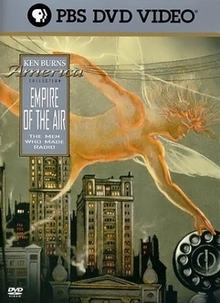
Edwin Howard Armstrong was an American electrical engineer and inventor, who developed FM radio and the superheterodyne receiver system.
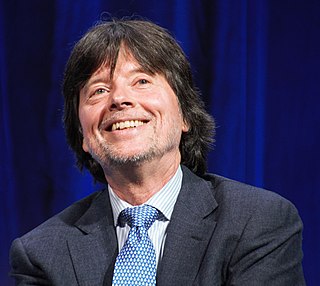
Kenneth Lauren Burns is an American filmmaker and historian known for his documentary films and television series, many of which chronicle American history and culture. His work is often produced in association with WETA-TV and/or the National Endowment for the Humanities and distributed by PBS.

David Sarnoff was a Russian and American businessman who played an important role in the American history of radio and television. He led RCA for most of his career in various capacities from shortly after its founding in 1919 until his retirement in 1970.
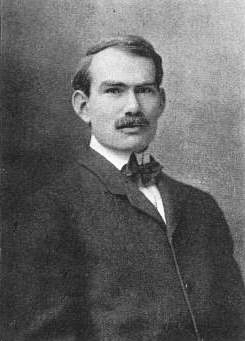
Lee de Forest was an American inventor and a fundamentally important early pioneer in electronics. He invented the first practical electronic amplifier, the three-element "Audion" triode vacuum tube in 1906. This helped start the Electronic Age, and enabled the development of the electronic oscillator. These made radio broadcasting and long distance telephone lines possible, and led to the development of talking motion pictures, among countless other applications.
The Alfred I. duPont–Columbia University Award honors excellence in broadcast and digital journalism in the public service and is considered one of the most prestigious awards in journalism. The awards were established in 1942 and administered until 1967 by Washington and Lee University's O. W. Riegel, Curator and Head of the Department of Journalism and Communications. Since 1968 they have been administered by the Columbia University Graduate School of Journalism in New York City, and are considered by some to be the broadcast equivalent of the Pulitzer Prize, another program administered by Columbia University.

The Civil War is a 1990 American television documentary miniseries created by Ken Burns about the American Civil War. It was the first broadcast to air on PBS for five consecutive nights, from September 23 to 27, 1990.

Baseball is a 1994 American television documentary miniseries created by documentary filmmaker Ken Burns about the history of the sport of baseball.

Geoffrey Champion Ward is an American editor, author, historian and writer of scripts for American history documentaries for public television. He is the author or co-author of 19 books, including 10 companion books to the documentaries he has written. He is the winner of seven Emmy Awards.
Jazz is a 2001 television documentary miniseries directed by Ken Burns. It was broadcast on PBS in 2001 and was nominated for an Emmy Award for Outstanding Documentary or Nonfiction Series. Its chronological and thematic episodes provided a history of jazz, emphasizing innovative composers and musicians and American history.

WETA-TV is the primary PBS member television station in Washington, D.C. Owned by the Greater Washington Educational Telecommunications Association, it is a sister station to NPR member WETA. The two outlets share studios in nearby Arlington, Virginia; WETA-TV's transmitter is located in the Tenleytown neighborhood in Northwest Washington.
Brooklyn Bridge is a documentary film on the history of the Brooklyn Bridge and the directorial debut of Ken Burns. It was produced by Burns, Roger Sherman, Buddy Squires, and Amy Stechler in 1981.
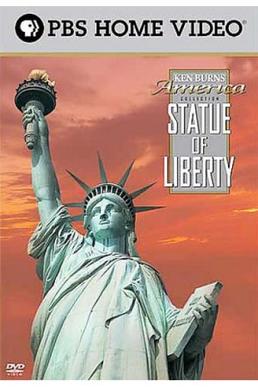
The Statue of Liberty is a 1985 American documentary film on the history of the Statue of Liberty. It was produced and directed by Ken Burns. The film, which first aired in October 1985, was narrated by historian David McCullough.
The Congress is a 1988 documentary film directed by the Emmy Award-winning director Ken Burns. The Florentine Films production, which focuses on the United States Congress, aired on PBS on March 20, 1989.

The West, sometimes marketed as Ken Burns Presents: The West, is a 1996 television documentary miniseries about the American Old West. It was directed by Stephen Ives and featured Ken Burns as executive producer. It was first broadcast on PBS on eight consecutive nights from September 15 to 22, 1996.

The National Parks: America's Best Idea is a 2009 television documentary miniseries by director/producer Ken Burns and producer/writer Dayton Duncan which features the United States National Park system and traces the system's history. The series won two 2010 Emmy Awards; one for Outstanding Nonfiction Series and one for Outstanding Writing for Nonfiction Programming in Episode 2 "The Last Refuge". A companion book (ISBN 978-0307268969) was released alongside.
Lewis & Clark: The Journey of the Corps of Discovery is a 1997 television documentary miniseries about the Lewis and Clark Expedition directed and co-produced by Ken Burns. It is produced by Burns' Florentine Films for Washington, DC PBS station WETA-TV, first aired on PBS on November 4 and 5, 1997.

Dalton Delan is an American writer, syndicated columnist, and television producer. He pens his syndicated column, the Unspin Room, for the Pulitzer Prize winning newspaper The Berkshire Eagle. His work with PBS and Sundance have won him numerous awards for documentaries and primetime shows. A number of his projects include working alongside notable figures like actor Robert Redford, Ken Burns and Henry Louis Gates Jr. Delan oversaw the production of sixteen In Performance at the White House programs in collaboration with the Obama administration, as well as several under the Bush and Clinton administrations years prior. As executive producer, Delan brought music giants like Bob Dylan, Paul McCartney, Mick Jagger, Stevie Wonder, Paul McCartney, Burt Bacharach, and Carole King to the White House. The final program under the Obama administration, The Smithsonian Salutes Ray Charles, is documented on YouTube as "WETA at the White House", features singers like Demi Lovato, Usher, and Anthony Hamilton.
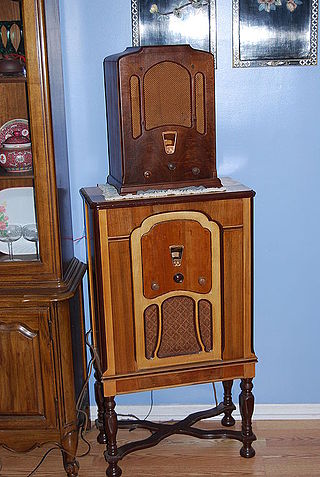
In 1931 RCA introduced a new line of Superette radio receivers. These used the superheterodyne principle but were lower cost than earlier products, in an attempt to maintain sales during the onset of the Great Depression.

Esther Marion Armstrong was the widow of pioneering radio FM inventor Edwin Howard Armstrong. She is notable for continuing — and winning — her husband's patent lawsuits against some of America's largest electronics manufacturers after his suicide. In 13 years of litigation, she was victorious in every battle over her husband's patents, winning financial settlements that restored her vast wealth. In her final years she established awards and took other steps to honor her husband's accomplishments.

